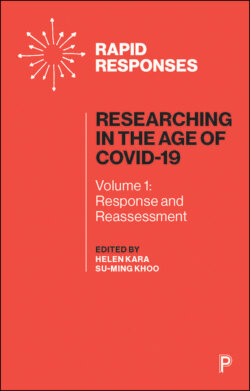Researching in the Age of COVID-19 Vol 1

Реклама. ООО «ЛитРес», ИНН: 7719571260.
Оглавление
Группа авторов. Researching in the Age of COVID-19 Vol 1
Researching in the Age of COVID-19. Volume 1: Response and Reassessment
Table of contents
List of figures and tables. Figures
Tables
Notes on contributors
Introduction
References
1 Evaluating strategies to improve the effectiveness and efficiency of CATI-based data collection during a global pandemic
Introduction
Data source
Results and findings
Factors that influence response rates: follow-up surveys, incentives, scheduling
Factors that influence refusal rates: audio audits
Conclusion
Notes
References
2 Going virtual: finding new ways to engage higher education students in a participatory project about science
Introduction
The project
Science camps
Virtual science camps
Benefits and limitations
Note
References
3 Disorientation and new directions: developing the reader response toolkit
Disorientation and unfamiliar spaces
Developing the reader response toolkit
New questions and new directions
References
4 Digital divide in the use of Skype for qualitative data collection: implications for academic research
Introduction
An overview of our studies
Study methodology
The moment of realization…
Digital divide in the use of Skype for academic research
Misconceptions of the digital divide
Socio-economic status as a determinant of digital access and use
Understanding the digital divide in the United Kingdom and Uganda: recommendations for academic research
Avoid researcher bias with regard to the digital divide
Appropriate planning and flexibility to support participants at all levels of the digital divide is essential
Consider the use of gatekeepers in communities with little or no penetration of ICT
Conclusion
References
5 Qualitative data collection under the ‘new normal’ in Zimbabwe
Introduction
Qualitative research and the COVID-19 pandemic
Potential video, voice and text-based options
Advantages and disadvantages
Ethical considerations
Conclusion and recommendations
References
6 Social surveys during the COVID-19 pandemic
References
7 Structured literature review of psychological and social research projects on the COVID-19 pandemic in Peru
Methodology. Procedure
Inclusion criteria
Exclusion criteria
Analysis
Results
Knowledge field
Proposal: objective and keywords
Methodology
Institution of affiliation and funding
Discussion
References
8 Switching over instead of switching off: a digital field research conducted by small-scale farmers in southern Africa and Indonesia1
Introduction
Research location and research focus
Research topic
Methodology
Reasons for choosing these methods
Research implementation, challenges and feedback
Ethical considerations and creativity
Notes
References
9 Research methods to understand the ‘youth capabilities and conversions’: the pros and cons of using secondary data analysis in a pandemic situation
Introduction
Youth capabilities and conversions: how to capture them?
Secondary methods in a pandemic: pros and cons
Conclusion
References
10 Conducting the emergency response evaluation in the COVID-19 era: reflections on complexity and positionality
Introduction
Responding to the pandemic and child poverty
Reassessing the emergency response evaluation
Redesigning the evaluation of the emergency response
Reconsidering ethics in emergency evaluation
Reflections on researcher positioning in a pandemic
Note
References
11 Challenges of a systematization of experiences study: learning from a displaced victim assistance programme during the COVID-19 emergency in ethnic territories in Colombia1
Systematization of experiences study: acknowledging team and community achievements in culturally safe psychosocial interventions
Challenges and achievements in our online participatory procedure
Conclusions: challenges and lessons learned
Notes
References
Conclusion
References
Отрывок из книги
Edited by
Helen Kara and Su-ming Khoo
.....
Paramjeet Chawla
10 Conducting the emergency response evaluation in the COVID-19 era: reflections on complexity and positionality 105
.....